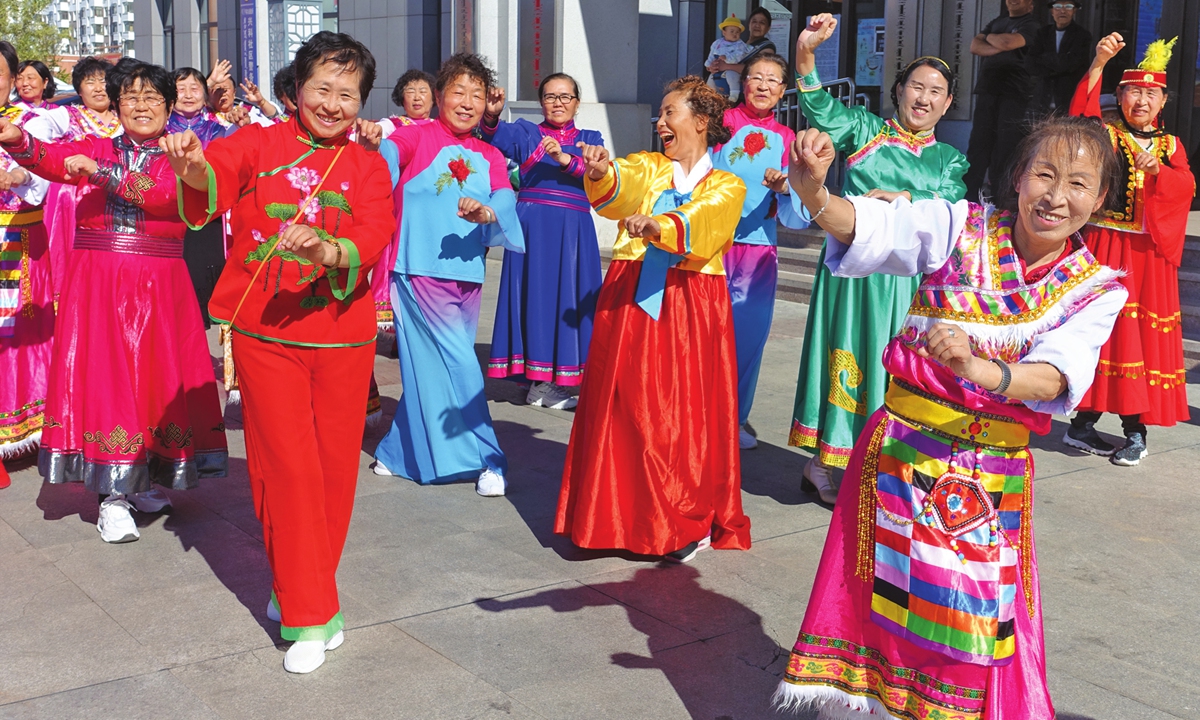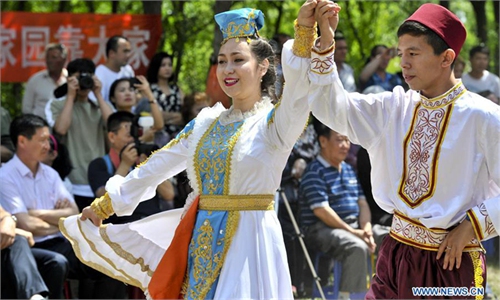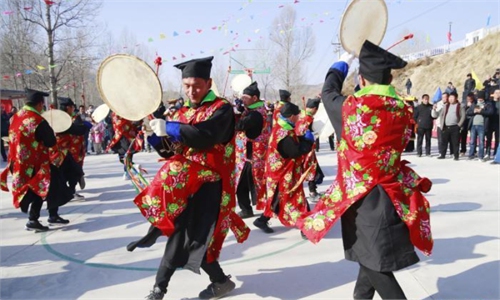China considers law amendment to make local authorities 'forge a strong sense of community for the Chinese nation'

Women dance in costumes of different ethnic groups at Xinke community in Horqin Right Front Banner. File Photo: GT
The National People's Congress (NPC), China's top legislature, is considering an amendment to the law on local legislatures and governments to add "forging a strong sense of community for the Chinese nation" as a responsibility of local authorities. Experts said the amendment will better clarify the responsibilities of local authorities in realizing the great rejuvenation of the Chinese nation as stipulated in the Constitution.
The draft amendment of the China's Organic Law of the Local People's Congresses and Local People's Governments was delivered at the opening meeting of the fifth session of the 13th National People's Congress (NPC) held on Saturday. Adopted in 1979, the law will go through its sixth amendment.
"As a basic law stipulating the organization and operation of local legislatures and governments, it serves as an important institutional guarantee for local state organs of power and administrative organs to exercise their powers and perform their duties," said Wang Chen, Vice Chairman of the NPC Standing Committee.
The clauses "forging a strong sense of community for the Chinese nation" and "promoting extensive exchanges, communication and integration among ethnic groups" were added to the responsibilities of local people's congresses and governments, said Wang.
He added that the amendments were made according to the Constitution and the central conference on ethnic affairs held in August, 2021, which highlights consolidating the sense of community for the Chinese nation and governing ethnic affairs in accordance with the law.
Revisions were also made to several articles of the law.
According to the amendment, local people's congresses and governments should "protect the lawful rights and interests of the ethnic minorities," a change from "protecting the rights of ethnic minorities."
When exercising their functions and powers, people's congresses at townships with high populations of ethnic minorities can adopt specific measures in alignment with the ethnic characteristics, "using authority as prescribed by law," the amendment shows.
Besides, in the functions and powers of local people's governments, the clause of "respecting the customs and habits of ethnic minorities" was changed to "guaranteeing the freedom of ethnic minorities to maintain or reform their customs and habits."
Chang An, professor from the Northwest University of Politics and Law, told the Global Times on Sunday that the revision to the articles emphasized the lawful rights and interests of ethnic groups as well as the limits and scope of authority stipulated by law, which comes amid China's efforts in further deepening the comprehensive rule of law and promoting the governance of ethnic affairs according to law.
The emphasis on "protecting the freedom of ethnic minorities to maintain or reform their own customs and habits" is due to the fact that customs and habits are not necessarily immutable. It is not equal to solidifying and strengthening the backward factors affecting ethnic groups progress, said Chang.
Ethnic groups have become more closely connected in social life than ever before over the past 70 years, especially since the launch of the reform and opening-up, Chang said, adding that China's population distribution, where ethnic groups are largely scattered and small groups live in compact communities, shows a new large mobility and integration.
"Therefore, ethnic affairs need to be governed in ethnic autonomous regions and ordinary administrative areas as well. It is also the responsibility of local people's congresses and governments to promote integration among ethnic groups, which is a requirement for the great rejuvenation of the Chinese nation as stipulated in the Constitution," said Wang.
In an explanatory speech on the draft, Wang stressed that the amendment is also a major step to develop whole-process people's democracy and ensure it is the people who run the country.



